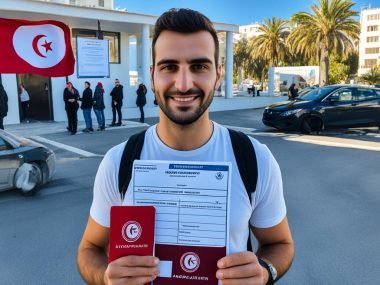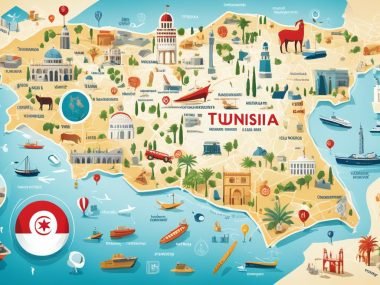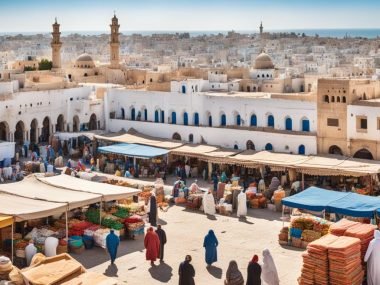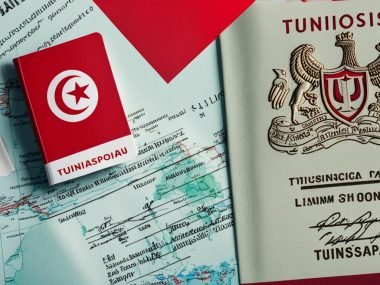Since Tunisia’s 2011 revolution, there was hope for freedom of expression. However, recent actions by President Kais Saied have sparked worries. On July 25, 2021, he declared a state of exception. This led to dissolving parliament and taking over legislative powers. Such moves have raised red flags about free speech in Tunisia.
New laws, specifically Decree Law No. 54 of 2022, have tightened controls on internet speech. People like lawyers Ayachi Hammami and Ghazi Chaouachi, politician Shaima Issa, journalist Nizar Bahloul, and student Ahmed Bahaa Eddin Hamada are now under threat for their online posts. These developments alarm those concerned about human rights in Tunisia. The crackdown is dimming the freedoms gained in 2011.
Key Takeaways
- Tunisia’s 2011 revolution marked a significant milestone in securing freedom of expression.
- President Kais Saied’s declaration of a state of exception on July 25, 2021, has raised concerns about Tunisia’s commitment to free speech.
- Decree Law No. 54 of 2022 introduces severe restrictions on online speech.
- The prosecution of individuals like Ayachi Hammami and Nizar Bahloul reflects the nation’s deteriorating stance on freedom of expression.
- International human rights organisations have raised concerns over the erosion of civil liberties in Tunisia.
Introduction to Free Speech in Tunisia
Tunisia has seen big changes in its approach to free speech, especially with the president gaining more power. New laws on free speech have made people worried about their impact on public discussions. These concerns focus on limited talks about the economy and food safety, hurting free expression.
Amnesty International has raised alarms about Decree-Law 2022-14. They say it’s too unclear and suppresses different opinions. This move towards more censorship shows a larger plan to control information and cut down on political freedoms in Tunisia. The crackdown on opposing voices is getting tougher, showing a troubling change in Tunisia’s free speech law.
Legal actions against government critics show the risky state of free speech and political rights in Tunisia. With these laws in action, the chance for open and honest debate is getting lower. This indicates a growing push for more censorship and less freedom.
Historical Context of Tunisian Free Speech Laws
The journey of freedom of expression in Tunisia is long. It goes through major political shifts impacting rights. Before and after the revolution, we see clear differences in the fight for freedom.

Pre-Revolution Period
Before 2011, Tunisia was under strict censorship by an authoritarian government. This regime controlled the media tightly, limiting press freedom in Tunisia. Getting information was hard. Those who challenged the government risked detention.
| Aspect | Pre-Revolution | Post-Revolution |
|---|---|---|
| Government Control | Authoritarian | Democratic Aspirations |
| Media Freedom | Heavily Censored | Constitutionally Guaranteed |
| Public Dissent | Suppressed | Encouraged but Threatened Recently |
Post-Revolution Changes
The 2011 revolution brought hope to Tunisians. The 2014 Constitution protected speech and media rights in Tunisia. People wanted open governance. Yet, recent changes by President Kais Saied worry many about losing these freedoms.
The progress towards press freedom in Tunisia may be reversing. New laws seem like steps back. This has sparked debates over the real state of Tunisia freedom of expression.
Impact of Political Events on Freedom of Expression in Tunisia
Tunisia has undergone dramatic changes since July 2021 under President Kais Saied. He suspended the constitution and made major changes to the judiciary. These moves have raised alarms about Tunisia human rights being under threat.
The president’s power has grown, raising questions about the recent referendum and elections. Public discussion has been greatly limited, with new Tunisia censorship laws in place. This creates a controlled setting where speaking freely is hard.
These political actions have made it hard for those who disagree to speak up. With less chance for open discussion, Tunisia human rights and democratic values are at risk. We must now look closely at how Tunisia censorship laws affect civil freedoms.
Below, we explore a table showing how key events have influenced freedom of speech in Tunisia:
| Event | Description | Impact on Freedom of Expression |
|---|---|---|
| Suspension of Constitution | President Kais Saied’s action in July 2021 | Significantly reduced checks and balances, enabling more stringent Tunisia censorship laws |
| Replacement of High Judicial Council | Appointment of new judicial body by the President | Compromised judiciary independence, increasing executive control over dissent |
| Referendum on New Draft Constitution | Held in an opaque manner with limited public input | Further erosion of democratic processes and shrinking debate spaces |
| Legislative Elections | Brought forward by President, under new constitutional framework | Unfair process with restricted political freedom and expression |
Does Tunisia Have Freedom Of Speech?
Is Tunisia really free to speak out? This is crucial now, especially with the Tunisian government’s recent moves. Two main laws, Decree Law No. 54 and Decree-Law 2022-14, have seriously limited online talk.
Many journalists, activists, and critics find themselves under legal pressure. This raises worry about Tunisia’s freedom of speech. Human rights groups are alarmed, seeing these events as a step back in democracy. Also, the President’s broad powers make it hard to say Tunisia has free speech.
Recently, emergency laws have made talking freely even harder. These rules not only limit speech but also scare people into silence.
To really understand Tunisia’s situation, we need to look at the whole picture. New laws against online speech and targeting government critics show shrinking room for open dialogue.
| Issue | Description | Impact |
|---|---|---|
| Decree Law No. 54 | Introduces restrictions on online speech | Limits online expression and critic |
| Emergency Laws | Temporary laws to control public order | Instil fear and reduce public dissent |
| Prosecution | Targeting journalists, activists, and critics | Suppresses voices of opposition |
| Presidential Powers | Concentration of power in the presidency | Diminishes checks and balances |
Looking closely at these issues makes us question Tunisia’s free speech. The signs show a big risk to freedom of expression, making us doubt the country’s dedication to this key right.
Human Rights and Civil Liberties in Tunisia
Tunisia has seen setbacks in human rights and freedom of speech. It goes against many global human rights rules. The country’s actions do not match the International Covenant on Civil and Political Rights, especially on necessity and proportionality.
International Human Rights Obligations
New laws and government orders in Tunisia are worrying from a human rights perspective. These harsh laws increase the control over free speech and media. This trend ignores Tunisia’s global duties and harms democracy.
Violation of Freedoms
There are many reports of human rights breaches in Tunisia, especially against free speech. People criticizing political leaders face harsh punishment. Efforts to quiet opposition are growing.
Concerns also exist about women’s rights and LGBTQ+ discrimination. These issues show a great need for changes in the system.
Challenges Faced by Journalists and Media in Tunisia
The state of press freedom Tunisia has faced significant challenges lately. Journalists and media face harassment, arbitrary detention, and tough laws. These laws stop them from sharing facts the state doesn’t like. This issue really hurts the democracy that started after the 2011 revolution.
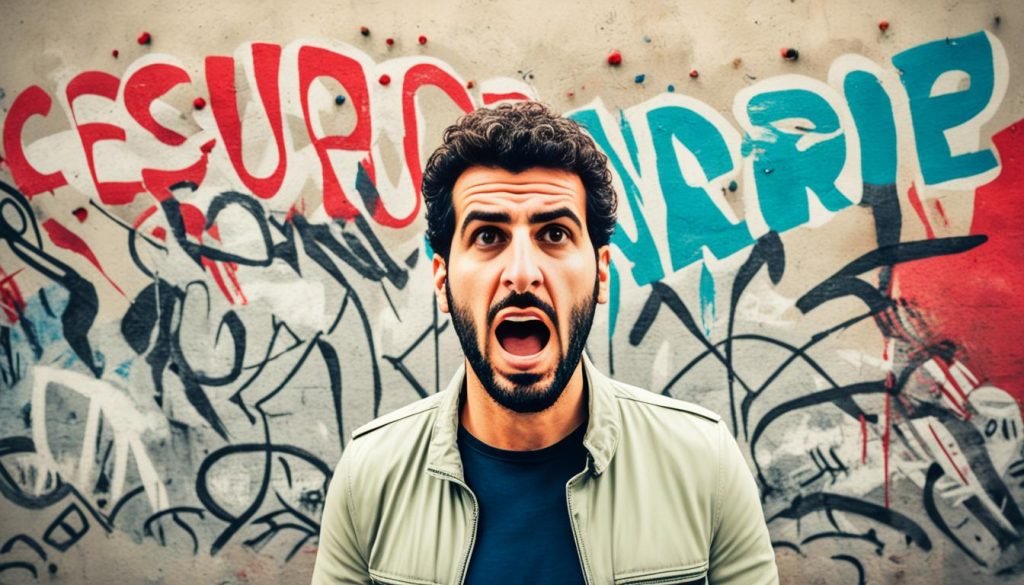
Also, the situation for press freedom Tunisia is made worse by laws that punish critical reports. Journalists critiquing the government are often taken to court. This limits free and independent journalism. It creates a fear among media professionals, making their work very risky.
Key challenges observed include:
- Frequent harassment and intimidation of journalists by those in power and others.
- Arbitrary detention and legal issues for those who post critical or deep investigations.
- Laws are unclear and harsh, making it risky to disagree.
The current state of press freedom Tunisia is very concerning. It needs immediate action from both local and global groups that support freedom and human rights.
Conclusion
Tunisia is facing tough times regarding speaking freely. After the 2011 revolution, people enjoyed more freedom in public discussions and civil rights. But, the political scene has changed a lot. Particularly since President Kais Saied made a big decision on July 25, 2021. Laws like Decree Law No. 54 of 2022 have started limiting what can be said publicly.
In Tunisia’s recent past, being able to speak out and question the government was key for democracy. But now, things look quite different from those ideals. Taking legal action against people like Ayachi Hammami and Ghazi Chaouachi, for their online comments, shows a step back. These legal steps not just mute these voices but scare others from talking openly too.
Looking at this issue from a global standpoint, Tunisia’s commitment to human rights seems shaky. The current steps taken are against global human rights guidelines, especially regarding fairness and need. Reflecting on Tunisia’s path, there’s a clear shift towards censorship, away from balancing security and speech freedom. To put it simply, whether Tunisia can keep its speech freedom is amidst heated debates that touch its democracy and human rights standing.


